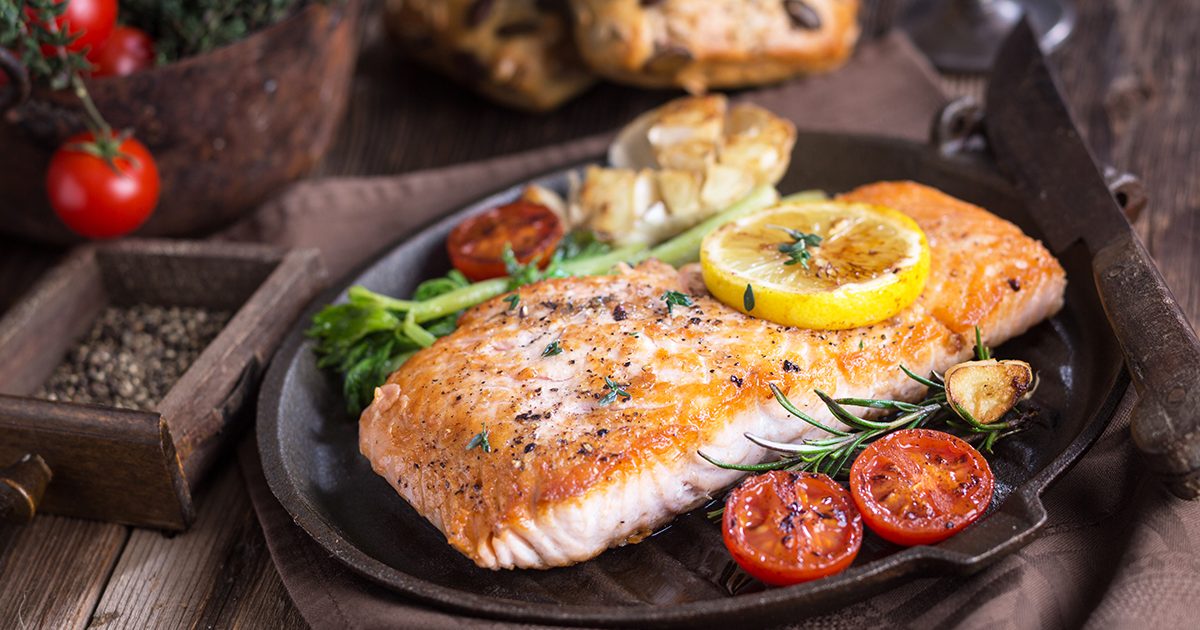Diet & Cancer: The Connection
- New research published Wednesday uncovered a link between a person's fish consumption and their risk of developing melanoma, the deadliest form of skin cancer.
- However, the study's findings aren't causing its lead author, or other experts (including SurvivorNet experts), from cautioning against eating fish.
- SurvivorNet experts agree that diet and cancer risks are closely related. But removing these suspected triggers doesn’t always stop cancer from developing, and indulging in them doesn’t necessarily mean a person will get cancer.
However, the study's findings aren't causing its lead author, or other experts (including SurvivorNet experts), from cautioning against eating fish.
Read More"I will continue to eat fish, especially if I can find a good fish taco, (which is) hard to do outside California."

Study Details
The study, which was published in Cancer Causes & Control on Wednesday, "examined the associations between intake of total fish and specific types of fish and risk of melanoma" in 491,367 participants of the N.I.H.-A.A.R.P. Diet and Health Study, which was "developed at the National Cancer Institute of the National Institutes of Health to improve our understanding of the relationship between diet and health."
Participants were between the ages of 50 and 71 and each completed forms answering questions about their fish intake, among other things. They were then followed for about 15 years in order to track their health progress, and see who was diagnosed with cancer, and what type.
The study concluded that when compared to the people who didn't eat much fish, those who ate the most fish (about 10 ounces per week) had a 22% higher risk of developing melanoma skin cancer.
"We found that higher total fish intake, tuna intake, and non-fried fish intake were positively associated with risk of both malignant melanoma and melanoma in situ," according to the study's concluding statement. "Future studies are needed to investigate the potential biological mechanisms underlying these associations."
As previously stated, while this study isn't causing experts to advise people not to each fish, it also doesn't change the fact that the sun exposure and/or tanning bed use remains the highest risk for developing melanoma.
Diet & Cancer: The Connection
SurvivorNet experts agree that diet and cancer risks are closely related.
Overcooked red meat, processed foods like bacon, as well as fatty meats have all been associated with an increased cancer risk.
However, removing these suspected triggers doesn’t always stop cancer from developing, and indulging in them doesn’t necessarily mean a person will get cancer. There’s a bit more to understanding cancer risk than that.
The Role of Diet and Exercise in Cancer Risk
We are exposed to carcinogens (substances that can cause cancer) throughout our daily lives, such as when we prepare food. But many people won’t go on to develop the disease, according to Dr. Robert Wright, chair of the Department of Environmental Medicine and Public Health at Mount Sinai.
"We create carcinogens all the time in our foods when we cook them, and very few of us get cancer because our bodies can handle them," Dr. Wright explained. "But some people have susceptibilities to these environmental carcinogens, which might be genetic or might be caused by combinations of carcinogens."
It’s important to understand that no one trigger is going to definitively cause cancer, Dr. Wright said, but it could be a combination of triggers in the environment.
"Cancer isn't caused by one event, typically, it's usually a series or combination of events," he added. "So, it may be that you ate a lot of charred food, it may be that you're also a smoker, it may be that you've inherited a genetic susceptibility to be a little bit more sensitive to those chemicals."
No matter what anyone tells you, as far as we know, there’s no single food that doctors can point to, with absolute certainty, and say it decreases cancer risk. But that doesn’t mean that healthy eating habits aren’t important!
When it comes to dietary advice that applies to everyone, Dr. Wright is straightforward: eat more vegetables and stay active.
"What we haven't figured out for cancer is, what is the combination of risk factors that end up leading to a particular person getting cancer," Dr. Wright said during a previous interview with SurvivorNet. "The goal (in the future) is to identify those people who are more susceptible to cancer and to give them counseling and foods that they can eat and other habits like exercise that can reduce their risk. Right now, we're not really good at predicting that."
What to Know About Diet and Exercise if You Have Cancer
While some cancers develop from inherited genes, most don’t, so researchers are working on ways to understand how lifestyle factors like diet, exercise and chemical exposures put people at risk.
With that in mind, Dr. Wright stressed that eating well and staying active are still important for all of us.
"In the end, prevention is actually kind of simple," he said. "It's what we always know. It's exercise and eat well. That means eating more vegetables and less meats, particularly red meats."
Understanding Melanoma
Melanoma is a skin cancer that starts in the cells that give your skin, hair and eyes their color.
"Melanomas are the deadliest type of skin cancer because they have a tendency to spread to other parts of the body," Dr. Anna Pavlick, an oncologist at Weill Cornell Medicine, previously told SurvivorNet.
Am I at High Risk for Melanoma?
Melanoma can develop from an existing mole or appear as a dark or pink growth on the skin, even on, or in, parts of the body that never see the sun.
Paying attention to moles or growths on your skin is an easy way to keep an eye out for melanoma. Discovering changes to an existing mole or a new growth on your skin can be signs of this cancer, according to SurvivorNet experts.
Spots on your skin can be harmless, but it’s important to monitor them and contact your doctor if you find cause for concern. Using sunscreen regularly can also lower your risk of developing melanoma.
How to Protect Your Skin From Skin Cancer
Dr. Dendy Engelman, a board-certified dermatologic surgeon and associate at Manhattan Dermatology and Cosmetic Surgery, previously told SurvivorNet that protecting your skin is easy with these simple steps:
Top 5 Ways to Protect Your Skin From Skin Cancer
- Sun avoidance during peak hours: This means from 10 a.m. to 2 p.m. It doesn't mean you should never go outside during the middle of the day, but make sure you're protected when you go outdoors.
- Cover your skin and eyes: Wearing a wide brim hat or sunglasses will protect your face, the top of your head, your ears and the delicate skin around your eyes.
- Wear an SPF of 30 or higher: Plenty of facial moisturizers have SPF built into them. Dr. Engelman recommends reapplying every few hours, or after excessive sweating or swimming.
- Get an annual skin check: If you happen to notice anything out of the ordinary in between checks, schedule an appointment to talk to your doctor as soon as possible.
- No-go to tanning beds: Tanning beds can significantly increase your risk of developing melanoma. If you feel like you're just too pale, Dr. Engelman recommends a sunless tanner.
Learn more about SurvivorNet's rigorous medical review process.


